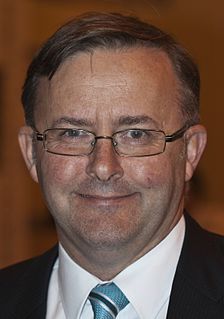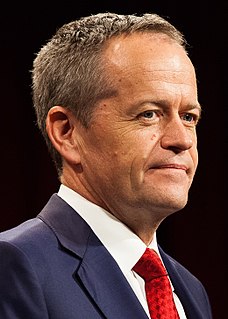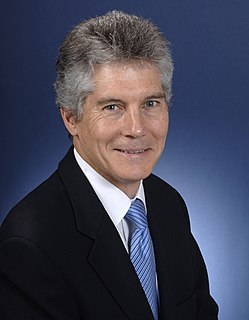 W
WThe Rudd Government (2007–2010) was the former government of Australia formed by the Australian Labor Party and led by former Prime Minister Kevin Rudd. The Rudd Government commenced on 3 December 2007, when Rudd was sworn in along with his ministry. This took place just nine days after the defeat of the Howard Government, which was a Coalition of members of the Liberal and National parties, at the 2007 federal election. The Rudd Government concluded on 24 June 2010 when Rudd, under pressure from an impending leadership caucus ballot, stepped down from the leadership of the Australian Labor Party and was succeeded by his deputy, Julia Gillard. Rudd was re-elected leader of the Labor Party in 2013 and served a second term as prime minister.
 W
WThe Second Rudd Government was the federal executive Government of Australia led by Prime Minister Kevin Rudd of the Australian Labor Party. It commenced on 27 June 2013 and ceased on 18 September 2013. Rudd had previously served a term as Prime Minister from 2007 to 2010 and been replaced by his deputy Julia Gillard, following an internal party spill. Rudd regained the Labor Party leadership by successfully re-challenging Gillard in a June 2013 party spill. On 5 August, Rudd called an election for 7 September 2013, which resulted in the defeat of his government by the Liberal/National Coalition led by Opposition Leader Tony Abbott.
 W
WThe 2008 Australian federal budget for the Australian financial year ended 30 June 2009 was presented on 13 May 2008 by the Treasurer of Australia, Wayne Swan, the first federal budget presented by Swan, and the first budget of the first Rudd Government.
 W
WThe 2009 Australian federal budget for the Australian financial year ended 30 June 2010 was presented on 12 May 2009 by the Treasurer of Australia, Wayne Swan, the second federal budget presented by Swan, and the second budget of the first Rudd Government. Swan commented that the budget would be tougher than in previous years. "Projected government revenue has fallen by $200 billion since the last budget because of the global economic crisis."
 W
WThe 2010 Australian federal budget for the Australian financial year ended 30 June 2011 was presented on 11 May 2010 by the Treasurer of Australia, Wayne Swan, the third federal budget presented by Swan, and the third budget of the first Rudd Government.
 W
WA leadership spill occurred in the Australian Labor Party on 24 June 2010. Kevin Rudd, the Prime Minister of Australia, was challenged by Julia Gillard, the Deputy Prime Minister of Australia, for the leadership of the Australian Labor Party. Gillard won the election unopposed after Rudd declined to contest, choosing instead to resign. Gillard was duly sworn in as Prime Minister by Quentin Bryce, the Governor-General, on 24 June 2010 at Government House, becoming Australia's first female Prime Minister.
 W
WA leadership spill in the Australian Labor Party, the party of government in the Parliament of Australia, was held on 27 February 2012 at 10 am AEDT, followed by a ballot. The Prime Minister, Julia Gillard, announced the spill at a press conference on 23 February 2012, following the resignation of the Minister for Foreign Affairs, Kevin Rudd, from his cabinet position after months of speculation that he intended to challenge Gillard for the leadership. Rudd announced his intention to seek the leadership at a press conference on 24 February.
 W
WA leadership spill in the Australian Labor Party, the party of government in the Parliament of Australia, was held on 21 March 2013. Prime Minister Julia Gillard called a ballot for the Leadership and Deputy Leadership of the Labor Party for 4.30pm, following a press conference by former Labor Leader and Regional Minister Simon Crean over persistent leadership tensions. At the caucus meeting, no alternative candidates nominated for the positions, and so Gillard and Wayne Swan were re-elected unopposed.
 W
WA leadership spill in the Australian Labor Party, the party then forming the Government of Australia, took place on 26 June 2013 at 7:00pm AEST. Prime Minister Julia Gillard called a ballot for Leader and Deputy Leader of the Labor Party live on Sky News Australia at 4:00pm, following persistent leadership tensions. She stated that she would retire from politics if she lost the vote, while calling on any would-be challengers to pledge to do the same if they lost. In a press conference held shortly after Gillard's announcement, backbencher and former Prime Minister Kevin Rudd announced that he would challenge Gillard, whilst also pledging to step down if he did not win the vote. At the ALP caucus meeting, Rudd was elected Leader of the Labor Party, with the caucus voting 57–45 in his favour.
 W
WAnthony Norman Albanese is an Australian politician serving as Leader of the Opposition and Leader of the Labor Party since 2019. He has been Member of Parliament (MP) for Grayndler since 1996. Albanese was Deputy Prime Minister of Australia in 2013 and a Cabinet Minister in the Rudd and Gillard Governments from 2007 to 2013.
 W
WChristopher Eyles Guy Bowen is an Australian politician serving as Shadow Minister for Health since 2019, and has served as Member of Parliament (MP) for McMahon since 2010. Bowen served as Treasurer of Australia in 2013, and was a Cabinet Minister in the Rudd and Gillard Governments from 2007 to 2013.
 W
WBuilding the Education Revolution (BER) is an Australian government program administered by the Department of Education, Employment and Workplace Relations (DEEWR) designed to provide new and refurbished infrastructure to all eligible Australian schools. The program was part of the Rudd government's economic stimulus package designed as a response to the 2007–2010 global financial crisis.
 W
WThe Carbon Pollution Reduction Scheme was a cap-and-trade emissions trading scheme for anthropogenic greenhouse gases proposed by the Rudd government, as part of its climate change policy, which had been due to commence in Australia in 2010. It marked a major change in the energy policy of Australia. The policy began to be formulated in April 2007, when the federal Labor Party was in Opposition and the six Labor-controlled states commissioned an independent review on energy policy, the Garnaut Climate Change Review, which published a number of reports. After Labor won the 2007 federal election and formed government, it published a Green Paper on climate change for discussion and comment. The Federal Treasury then modelled some of the financial and economic impacts of the proposed CPRS scheme.
 W
WRobert John Carr is a retired Australian politician who served as Premier of New South Wales from 1995 to 2005, as the leader of the Labor Party. He later entered federal politics as a New South Wales senator, and served as Minister for Foreign Affairs from 2012 to 2013.
 W
WSimon Findlay Crean is a former Australian politician and trade unionist. He was a member of the House of Representatives from 1990 to 2013, representing the Labor Party, and served as a minister in the Hawke, Keating, Rudd and Gillard Governments. He was the leader of the Labor Party from November 2001 to December 2003.
 W
WThe Digital Education Revolution (DER) was an Australian government–funded educational reform program, promised by then prime minister of Australia Kevin Rudd during the launch of his 2007 Australian federal election campaign in Brisbane. It was officially launched in late 2008, with the first deployments announced by then Deputy Prime Minister of Australia and Minister for Education, Employment and Workplace Relations, Julia Gillard and then New South Wales counterpart, Verity Firth. The first deployment took place at Fairvale High School in August that year.
 W
WJoel Andrew Fitzgibbon is an Australian politician and Australian Labor Party (ALP) member of the Australian House of Representatives since March 1996, representing the Division of Hunter in New South Wales. Fitzgibbon is aligned with the ALP's Centre Unity faction in NSW. From December 2007 to June 2009 he was the Minister for Defence in the First Rudd Ministry. He resigned from cabinet in June 2009, following a series of controversies. In July 2013, following Kevin Rudd's election as Labor Leader, he was appointed the Minister for Agriculture, Fisheries and Forestry in the Second Rudd Ministry.
 W
WJulia Eileen Gillard is an Australian former politician who served as the 27th Prime Minister of Australia and Leader of the Labor Party from 2010 to 2013. She was previously Deputy Prime Minister of Australia from 2007 until 2010 and held the additional positions of Minister for Education, Minister for Employment and Workplace Relations and minister for Social Inclusion from 2007 to 2010. She is the first and only woman to hold the positions of Deputy Prime Minister, Prime Minister and leader of a major party in Australia.
 W
WThe First Rudd Ministry (Labor) was the 64th ministry of the Government of Australia, and was led by Prime Minister Kevin Rudd. It succeeded the Fourth Howard Ministry upon its swearing in by Governor-General Major-General Michael Jeffery on 3 December 2007 after the 2007 election, and was replaced by the First Gillard Ministry on 24 June 2010 when the deputy leader, Julia Gillard, became prime minister.
 W
WThe Second Rudd Ministry (Labor) was the 67th ministry of the Australian government, led by Prime Minister Kevin Rudd. It succeeded the second Gillard ministry after a leadership spill within the Australian Labor Party that took place on 26 June 2013. Three members of the ministry were sworn in by Governor-General Quentin Bryce on 27 June 2013. These were Kevin Rudd, Prime Minister; Anthony Albanese, Deputy Prime Minister; and Chris Bowen, Treasurer. The remainder of the ministry were sworn in on 1 July 2013.
 W
WMy Story is a political memoir of Julia Gillard, who served as the 13th Deputy Prime Minister of Australia from 2007 to 2010, and then the 27th Prime Minister of Australia from 2010 to 2013. She is the first, and to date, only woman to serve in either position. Published in 2014 by Random House Australia, My Story reflects on various personal aspects of her life and career, including her own analysis of the people and key players of the Rudd-Gillard Governments (2007–2013).
 W
WThe National Broadband Network (NBN) is an Australian national wholesale open-access data network project. It includes wired and radio communication components rolled out and operated by NBN Co Limited. Internet service providers, known under NBN as retail service providers or RSPs, contract with NBN to access the network and sell fixed Internet access to end users.
 W
WBrendan Patrick O'Connor is an Australian politician. He is a member of the Australian Labor Party (ALP) and has served in the House of Representatives since 2001. He held ministerial office in the governments of Kevin Rudd and Julia Gillard from 2007 to 2013, including as a member of cabinet from 2012. He has been a member of the shadow cabinet since the ALP's defeat at the 2013 federal election.
 W
WTanya Joan Plibersek is an Australian politician who served as Deputy Leader of the Labor Party and Deputy Leader of the Opposition from 2013 to 2019, and has served as Member of Parliament (MP) for Sydney since 1998. A member of the Labor Party, Plibersek served as a Cabinet Minister in the Rudd and Gillard Governments. She is currently the Shadow Minister for Education and Training.
 W
WThe Pacific Solution is the name given to the Government of Australia policy of transporting asylum seekers to detention centres on island nations in the Pacific Ocean, rather than allowing them to land on the Australian mainland. Initially implemented from 2001 to 2007, it had bipartisan support from the Coalition and Labor opposition at the time. The Pacific Solution consisted of three central strategies: thousands of islands were excised from Australia's migration zone or Australian territory, the Australian Defence Force commenced Operation Relex to intercept vessels carrying asylum seekers and the asylum seekers were removed to detention centres in Nauru and on Manus Island, Papua New Guinea, while their refugee status was determined. A number of pieces of legislation enabled this policy. The policy was developed by the Howard Government in response to the Tampa affair in August 2001 and the Children Overboard affair, and was implemented by then Australian Immigration Minister Philip Ruddock on 28 September before the 2001 federal election of 24 November.
 W
WKevin Michael Rudd is an Australian former politician who was the 26th Prime Minister of Australia, serving from December 2007 to June 2010 and again from June to September 2013. He held office as the leader of the Australian Labor Party.
 W
WWilliam Richard Shorten is an Australian politician who served as Leader of the Opposition and leader of the Australian Labor Party (ALP) from 2013 to 2019. Shorten was first elected as the member of parliament (MP) for Maribyrnong in 2007, and was a cabinet minister in the Gillard and Rudd Governments from 2010 to 2013.
 W
WStephen Francis Smith is a former Australian politician who was a member of the House of Representatives from 1993 to 2013. He served as a minister in the Rudd and Gillard Governments, including as Minister for Foreign Affairs (2007–2010), Minister for Trade (2010), and Minister for Defence (2010–2013).
 W
WPenelope Ying-Yen Wong is an Australian politician who has been a Senator for South Australia since 2002. She has served as Senate leader of the Australian Labor Party (ALP) since 2013, and is currently Leader of the Opposition in the Senate. She was a cabinet minister in the Rudd and Gillard Governments from 2007 to 2013. Born in Malaysia to an Australian mother and Malaysian father, Wong was educated at Scotch College in Adelaide, and then attended the University of Adelaide, graduating with Bachelor of Arts and Bachelor of Laws degrees. Prior to entering Federal parliament, Wong worked as a lawyer and political advisor. Wong has been described by her biographer as, "principled, intellectual, private, restrained and sane." In 2008, she became the first Asian-born member of an Australian cabinet. She was also the first female openly-LGBTI Australian federal parliamentarian and federal government cabinet minister, supporting legalised same-sex marriage in Australia despite having previously opposed it.